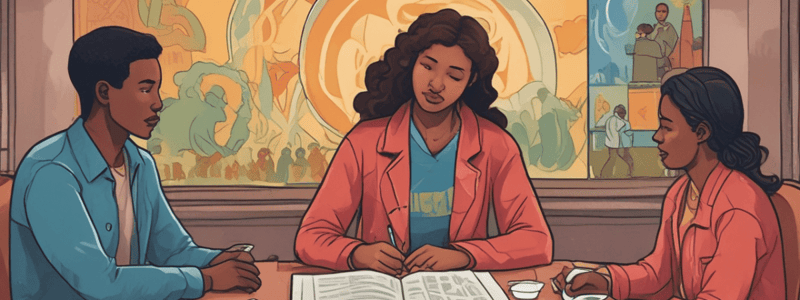Podcast
Questions and Answers
, ?
, ?
- .
- , , .
- , . (correct)
?
?
- (correct)
?
?
- , (correct)
பிரச்சினை தீர்க்கும் திறன்களை வளர்ப்பது எந்த காரணத்திற்காக முக்கியம்?
பிரச்சினை தீர்க்கும் திறன்களை வளர்ப்பது எந்த காரணத்திற்காக முக்கியம்?
கீழ்க்கண்டவற்றுள் எந்த மதிப்புகள் அமைதி கல்வியின் மையக் கருத்துகளாக அடங்கும்?
கீழ்க்கண்டவற்றுள் எந்த மதிப்புகள் அமைதி கல்வியின் மையக் கருத்துகளாக அடங்கும்?
கலாச்சார புரிதலை வளர்ப்பதன் நோக்கம் என்ன?
கலாச்சார புரிதலை வளர்ப்பதன் நோக்கம் என்ன?
சமூக நீதி என்பது எதைக் குறிக்கிறது?
சமூக நீதி என்பது எதைக் குறிக்கிறது?
பாகுபாடு மற்றும் சமூக அநீதிகளை எதிர்கொள்வதில் அமைதி கல்வியின் பங்கு என்ன?
பாகுபாடு மற்றும் சமூக அநீதிகளை எதிர்கொள்வதில் அமைதி கல்வியின் பங்கு என்ன?
Flashcards are hidden until you start studying
Study Notes
Values and Peace Education: Focusing on Conflict Resolution, Core Values, Intercultural Understanding, and Social Justice
Values and peace education are essential components of a comprehensive approach to creating harmonious societies. These programs aim to equip students and adults with the necessary skills, knowledge, and attitudes to understand and tackle various forms of injustices existing in society. They strive to promote peaceful coexistence and ensure a more just and equitable world. This article explores several subtopics within values and peace education, including conflict resolution, core values, intercultural understanding, and social justice.
Conflict Resolution
Conflict resolution is a crucial aspect of peace education that focuses on developing the skills and knowledge necessary for peaceful coexistence in the face of disagreements or conflicts. This includes understanding the root causes of conflict, identifying effective communication strategies, and learning to negotiate and compromise. Conflict resolution not only helps individuals navigate interpersonal disputes but also provides tools to address larger societal issues such as social inequality, discrimination, and violence.
Core Values
Core values are fundamental beliefs and principles that guide individuals' actions and decision-making processes. In the context of peace education, core values may include concepts such as empathy, respect, compassion, justice, and equality. By instilling these values in students, educators aim to foster an inclusive and tolerant society where people can coexist harmoniously despite their differences. These values serve as a foundation for promoting peaceful relationships, fostering mutual understanding, and preventing future conflicts.
Intercultural Understanding
Intercultural understanding is another key component of peace education that emphasizes the importance of recognizing and appreciating diverse cultures, traditions, and perspectives. It involves learning about different ethnic groups, religions, languages, and customs, as well as developing skills for communicating effectively across cultural boundaries. Intercultural understanding promotes acceptance and tolerance among people from various backgrounds, which is essential for promoting peace and social harmony.
Social Justice
Social justice is an integral part of peace education that aims to challenge existing systems of oppression and ensure equal access to resources and opportunities for all members of society. Peace education programs focus on raising awareness about structural inequalities related to socioeconomic status, race, gender, sexual orientation, religion, and other factors that contribute to marginalization. They encourage students to identify and confront these injustices through critical reflection, dialogue, and collective action. By empowering individuals with the knowledge and skills needed to challenge unjust structures, peace education contributes to the creation of more equitable societies.
In conclusion, values and peace education play a vital role in creating a more just and peaceful world by focusing on conflict resolution, core values, intercultural understanding, and social justice. These programs equip individuals with the necessary skills, knowledge, and attitudes to understand and tackle various forms of injustices, promote peaceful coexistence, and work towards eradicating structural and cultural violence. As educators, it is our responsibility to nurture the next generation with these foundational skills and values, ensuring a better future for everyone.
Studying That Suits You
Use AI to generate personalized quizzes and flashcards to suit your learning preferences.




